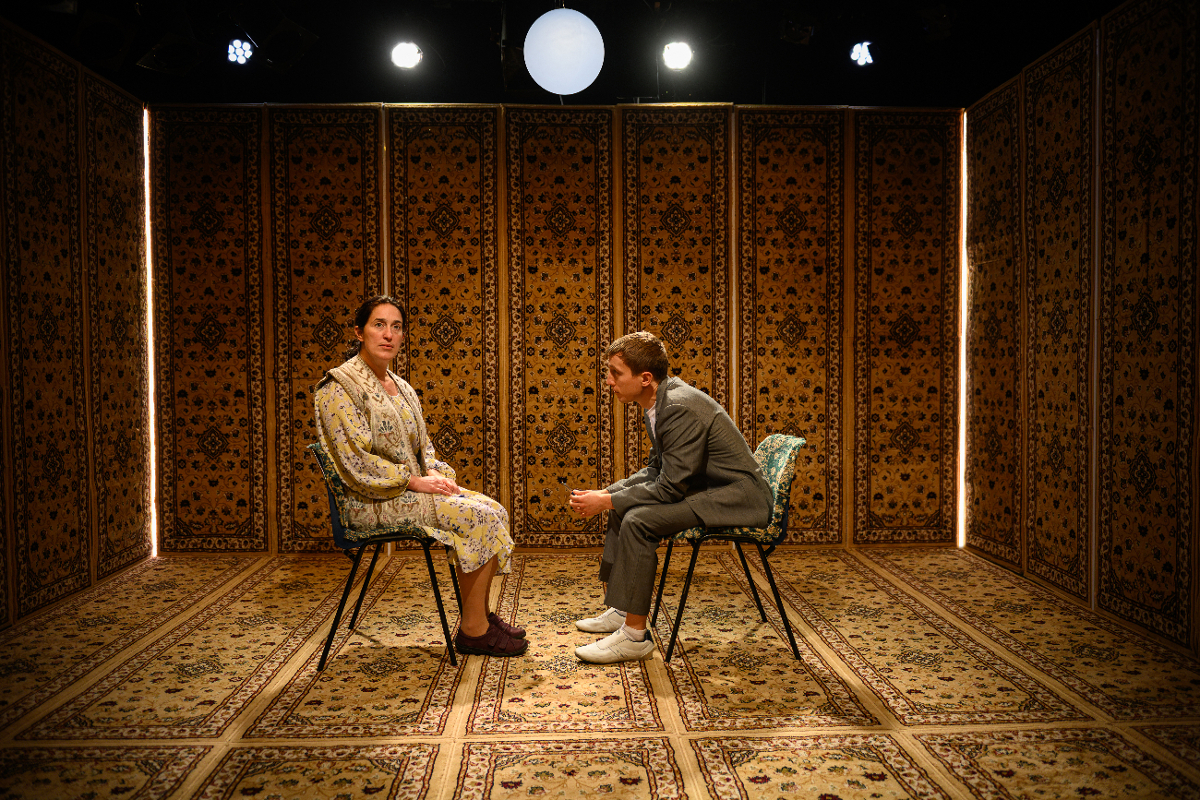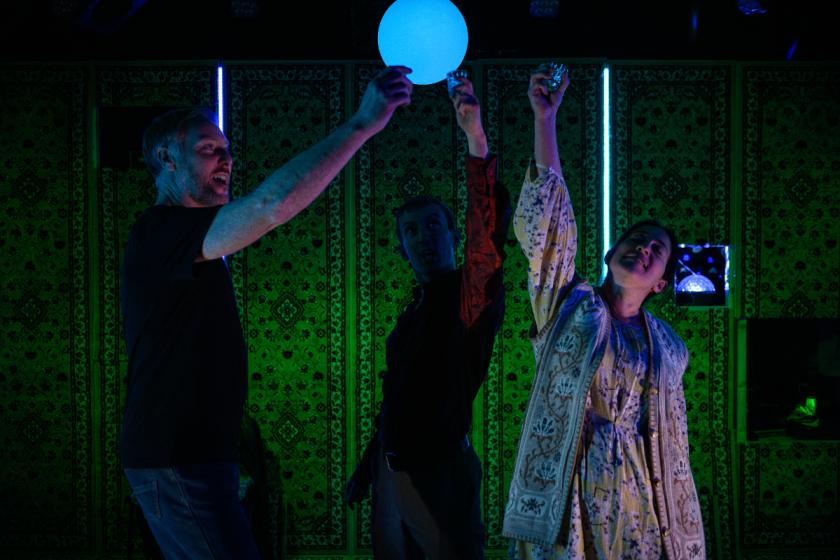We’re in Moscow (we hear that quite a lot) where an ageing woman on a rare trip out of her apartment block catches sight of an advert in a bank’s window. She is soon inside and subjected to a sales pitch by a keen young bank "manager", torn between his understanding of her dementia and the career-boost the loan will bring. Five months later, she’s in her little flat with a debt collector, a man even more ruthless in pursuit of his objectives – and events take an unexpected turn.
Theatre503 continues to find highly promising playwrights through its International Playwriting Award scheme, Roxy Cook the latest off that conveyor belt of talent, beating 1466 submissions from 49 countries to the top prize. Too often such awards bear the mark of compromise, a panel finding a winner that offends least rather than excites most, but with plays like this one and 2020’s winner, Moreno, that’s not a charge to be levelled at this venue .
Cook, who also directs with confidence, conjures a tale both specific to its time and place (set what we now must refer to as pre-Ukrainian War Russia), but one that resonates far beyond that to speak of urban alienation, intergenerational tension and the failures of an increasingly rapacious and unregulated capitalism. Embedded within a compelling narrative, there’s enough here to populate a whole sociology module on an undergraduate course without the drama ever descending into didactic browbeating.
 Giulia Innocenti (pictured above with Sam Newton) plays an old Moscovite woman, her daughter married and remitting money from overseas, her grandchildren barely speaking Russian, her memory slipping and sliding from one minute to the next. She gets called "Granny" but nobody says the word that must be in audiences’ minds – "Babooshka". That forbearance is indicative of Cook’s insistence on no Russian accents, no samovar bubbling in the corner of the room and no fur hats flecked with snow. That keeps the spectre of Dr Zhivagoish cosplaying at bay, but also lends a universality to a story that is rooted in the specificity of 21st century Russia, but not tied to it.
Giulia Innocenti (pictured above with Sam Newton) plays an old Moscovite woman, her daughter married and remitting money from overseas, her grandchildren barely speaking Russian, her memory slipping and sliding from one minute to the next. She gets called "Granny" but nobody says the word that must be in audiences’ minds – "Babooshka". That forbearance is indicative of Cook’s insistence on no Russian accents, no samovar bubbling in the corner of the room and no fur hats flecked with snow. That keeps the spectre of Dr Zhivagoish cosplaying at bay, but also lends a universality to a story that is rooted in the specificity of 21st century Russia, but not tied to it.
As the go-getting bank manager, Sam Newton is more clearly a type than the other two main characters, but invests his immature, insecure young man with a roundness of character that lifts him out of what might be something of a caricature role. He also channels Kenneth Williams to highly amusing effect in his portrayal of Sally, the old woman’s cat, destined to play a significant part in all three human lives she touches.
Keith Dunphy is initially a hulking presence as ‘Ivan’ the debt collector (“All debt collectors are called Ivan” he helpfully explains), ruthless, but damaged, wracked with guilt from his complicity in a Russia he neither asked for nor wants. He has a nostalgia for an older, simpler Russia, one in which chancers like his younger brother would not be able to weasel his way to the big car and the posh house. Dunphy’s Dublin accent also sounds uncannily like Terry Wogan’s, which may be a coincidence but works well to round off "Ivan’s" edges, humanising him.
The play is too long at pushing two and a half hours, though David Allen’s continually inventive set design avoids a common shortcoming of fringe theatre as there is always something interesting to look at. Some of that elongated runtime is down to characters repeatedly introducing themselves and the tendency to narrate incidents rather than show them. This technique is used increasingly by playwrights making their way in their craft, so Cook is not unusual in adopting it, but I’d much prefer to be shown than told the story.
What does set Cook apart from many contemporaries is the depth of her characterisation, each of the two men and one woman vividly written and sensitively portrayed by the fine cast. She also embraces the opportunity to tackle big social issues without their weight driving the story. Of course there are echoes of Chekhov, as one might expect, and references to the doom-laden Russian psychology, but the play could easily be set in Darlington or Detroit with just a few cultural indicators modified.
It’s both foolish and unfair to compare her with the greatest playwright of them all, but it would be fascinating to see what she could do with an Uncle Vanya or a Three Sisters, and to speculate on what she might write next. With a new director installed at the National Theatre, one hopes more doors will open for the likes of Cook, who has already worked there as an assistant director. With this accomplished debut as a writer, she shows she is ready for the greater responsibility that I have no doubt will soon come.















Add comment